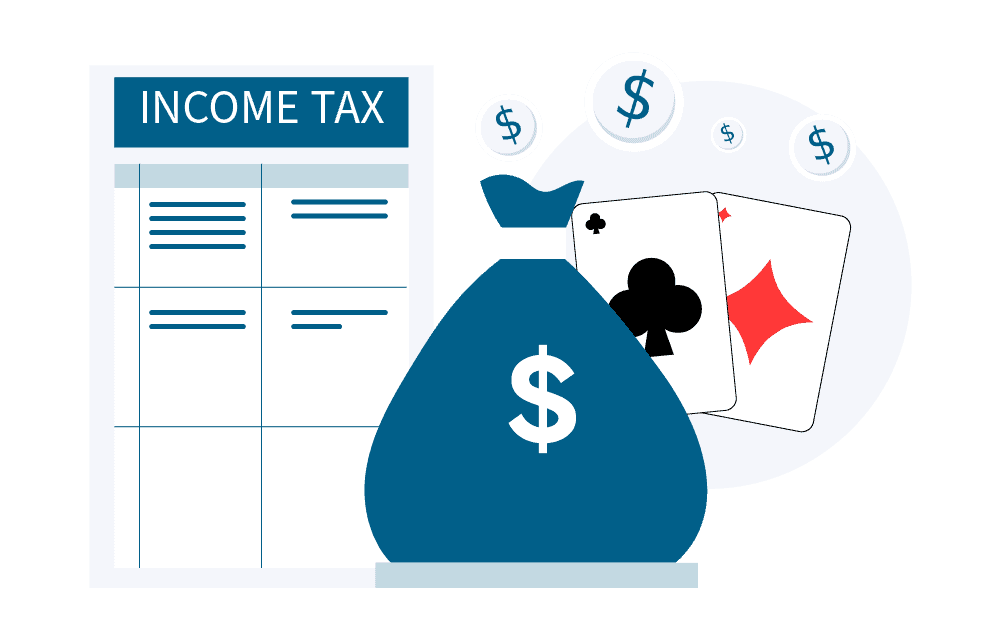Understanding Indian online gambling taxation laws and regulations may seem too difficult at first. At ENV Media we have, however, put the necessary man-hours and research efforts to back our findings with reputable legal sources and official publications.
In this article, we share with you our tips on how much of their winnings online players may expect to bring home when they win some real money on their favourite games.
The Big Picture on Indian Gambling Taxation
We set out to verify and publish what the offline and online gambling tax in India is simply because that is a question we have been asked numerous times – both by players and industry colleagues.
Naturally, a lot of technological and economic changes have come about globally over the past couple of years. India, as we know, moves somewhat slowly in legislative and administrative aspects but contributes immensely to the technological and economic growth of the whole Asian continent. Smartphone usage growth is peaking and along with that we have seen payment options that finally put the Indian consumer at ease when shopping and accessing entertainment.
When it comes to withdrawing funds, however, is the easy access to (mobile) gaming and online spending simply reversed for those same consumers? Lottery winners, casino gambling enthusiasts and skilful (or lucky) card game masters seek the most accurate information possible on gaming income fees and government impositions.
To understand the legal and taxation aspects of online gambling in India, one must be familiar with the outdated Public Gaming Act of 1867 which still sets up the foundation of gambling levy requirements and categories.
Then, players need to have decided what payment and withdrawal methods they will be relying upon for their gambling income (important for localisation and tax declaration purposes).
And finally, online casino gamers have to know that not all winnings from gambling by all kinds of players are taxed: you may not need to pay tax at all.
Nevertheless, we need to make an important distinction when it comes to gambling earnings location:
- On one hand, any kind of income from casinos and gambling (online or offline) should be reported in one’s annual tax form. Winnings, investments and earnings made in India are taxable, both for residents and non-residents! (The latter are taxed only on Indian income sources, naturally).
- However, like the Prevention of Money Laundering Act, (2002, PMLA) clearly states, “entities incorporated or established abroad should not be considered reporting entities” as per the Indian tax service administration.
What Are the Tax Laws and Regulations on Legal Gambling?
The cornerstones of Indian gambling taxation are set up in several legislative acts. Crucially, there is the Income Tax Act and its Section 194B. It defines the categories and tax brackets which are liable to such an income levy. Then, there is Section 115BB which has been introduced as an Amendment with the Finance Act of 1986.
The above legal dispositions declare taxable “any income [from] the lottery, crossword puzzle[,] race, including horse race or card game or any [other forms of] gambling or betting whatsoever.” Put simply, the Income Tax and Finance Acts place a flat 30% tax on all such income and winnings.
Are All Gambling Winnings Traced and Taxed?
With the famous distinction between Games of Skill vs. Games of Chance which we have already discussed in-depth, we are already aware that there are some games and platforms which are not entirely legal but still not explicitly outlawed.
Since the Income Tax Act states, however, that all gambling income should be taxed in India, there should be no distinction between Poker, Fantasy Sports, Horse racing, Casino, Lottery or any other offline and online gambling winnings in real money. (N.B. The Income Tax Act explicitly specifies that income from both legal and illegal activities is subject to taxation).
Therefore, a natural grey area is not surrounding taxation between types of gambling – even those legal in one states and illegal in other – but rather the status of online gambling. As such, it either did not exist at the time creation of said income tax laws; or has rapidly evolved beyond the imagination of the national and regional tax administrations (e.g. Fantasy Sports and e-Gaming platforms) – and practically beyond their reach.
Are There Any Indirect Taxes on Gambling Income?
Here’s where the issue of gaming taxation in India may start to seem a little more complicated. But we make it easy and short for you.
In India, the essential indirect tax on all products and services is the Goods and Services Tax (GST). There is a specifically defined category of entertainment events and services which lists casinos, racecourses and any related services. They are all taxable at a rate of 28%.
In general, however, players should not think about this tax much, as it is the registered supplier of goods and services that will need to pay the GST. Put simply, it is the equivalent of what Westerners are familiar with as Value Added Tax (VAT). Yes, it does affect the money a player puts in (before) they win; and it does decrease their return in purely statistical terms. But it is an indirect tax which is already included in the final product they purchase when they play. So no need to worry about calculations here!
Direct Surcharges on Income Taxation
We have already been clear on the universal 30% taxation of gambling income. Having used the “flat-rate” reference, however, we need to add an asterisk on certain surcharges and tax conditions for separate income groups.
- Should gambling earning exceed INR 50 Lakhs (INR 50,00,000 or ~EUR 57,400), there is a surcharge of 10% applicable to the normal tax rate, making it a total of 33%;
- Should the taxable gaming income exceed INR 1 Crore (1,00,00,000 or ~EUR 115,000), the surcharge becomes 15% of the tax rate, effectively raising it to 34.5%;
The above thresholds are, naturally, rare and applicable mostly to Lottery winnings (with online casinos not allowing such large withdrawals at one time anyway). Therefore, we need to emphasise the only surcharge which is currently a permanent addition to the flat-rate income tax on gambling winnings:
- The Health and Education Cess (surcharge) is set at 4%. It is added to the due tax and does not depend on income. It goes to finance national priorities in health and education, obviously, and is payable by all persons liable to income tax.
Hence, the ultimate tax rate for all casino and gambling earnings in India becomes 30% + 0.04×30% = 31.2%.
Are There Regional Differences in Gambling Taxation?
As much as the Indian States may differ in their permissiveness on gambling laws, practices and economic policy, they follow more or less the same established national approach to collecting gambling income taxes.
The 29 States and 7 Union Territories do decide their separate and specific gambling laws. But most of them follow the outdated Gaming Act as the foundation for their regulations, and the Income Tax Act on collecting levy from casino winners.
The Law Commission of India has urged Parliament to enact a model law which may help manage betting and gambling, including taxation issues. States will only have to follow suit afterwards and adapt the model to their current gambling rules and regulations. But we have not seen such initiatives so far.
The Bottom Line – Online and Offshore Casino Gaming Is Safe
Many risk-free casinos have already been established and operate quite effectively with Indian customers. They are aware that local laws cannot have a direct effect on their operations, even with ISP-blocking which may be evoked by various State and National authorities.
In our experience, the more successful operators concentrate on two things:
- product quality, given the ever-growing gaming culture among active internet users;
- payment/withdrawal efficiency, given that native gamblers, used to run into problems when making and receiving payments. There are, already, well-established payment methods that are integrated smoothly within the Indian online gaming ecosystem.
The steadily growing Indian online gambling market is not held back by taxation fears, fee burdens or any related legal structure issues.
National Gambling Tax Rules and Regulations
- To be able to accurately report gambling winnings, all Indian-based betting and gaming transactions should be linked to the so-called Aadhaar/PAN Card of both the operator and the player;
- Additionally, any income from betting or gambling should be declared under the proper category in the apposite income tax forms (as per the Income Tax Act of 1961, the Goods and Services Tax Act of 2017, and any other relevant laws);
- As much as Indian players may look at these gambling sessions as a form of “investment” (given the deep-rooted cultural implications of gambling in the country), their losses are not tax-deductible. Namely, Section 80C of the ITC states that deposits in funds and investment in bonds may be deductible but it does not apply to game sessions; as much as they may be (considered) determined by skill.
- There is a Non-Taxable Minimum on casino and gaming winnings: as per National regulations, operators should withhold the applicable tax amount when making payments to the winning player, should the winnings exceed INR 10,000 (~ EUR 115). Above that amount, one can expect to see their winnings cut by 30% (or rather 31.2%) when withdrawing funds.
Legality is key for reputable online casino operators. In light of the above definitions, gambling platforms which are present in India want to be able to provide entertainment and games that are traceable back to the player – both in terms of demand and respecting local income taxation regulations.
Native language casino tables online, unique desi promotions and the possibility to play in Rupees all point in that direction and highlight the commitment to provide games Indians love to play.
Are There Tax Differences by State?
Gambling taxation rules in India can indeed present some differences by State. Notable State-defined tax codes on gambling which stand to this day and influence residents have been instituted mostly by States which have a strong stance on gambling – whether permissive or prohibitory.
Examples include the Andhra Pradesh Horse Racing and Betting Tax Regulation 1358F of 1949 (valid for the Telangana Area) and the Delhi Entertainments and Betting Tax Act of 1996.
Even in such particular cases, however, there is a centralised approach in tax collection related to all gambling activities. Payable taxes are defined as “recoverable as a public demand”. For control options, that translates as most likely to be applied at the source – for both operators and players.
Variations between Offline and Online Gambling Taxation in India
Most of our clients and their players are concerned with how “foreign” gambling income is being taxed by Indian Authorities. One thing is certain, as we explained with the PMLA of 2002:
With most online operators being based outside of Indian jurisdiction, they are not subjected to local taxation laws.
What about Indian residents who receive winnings made at foreign online casinos? When and where do they have to declare and pay their related income taxes?
There is practically no legal difference between offline and online gaming income for Indian citizens. It has to be declared and taxed.
That is exactly why offshore casino operators tend to withhold the 30% tax (or 31.2% when applicable) before making payments back to the lucky winners.
In our experience, this approach is almost universally applied for all winnings exceeding the INR 10,000 (EUR 115) non-taxable minimum we explained above.
How to Pay Taxes on Online Gambling Income
Considering all of the above legal regulations and taxation practices, the intent of the Indian Authorities to tax gambling income centrally emerges as a leading principle. For most offshore and online operators, pragmatically, this can only mean taxing gaming winnings at the source to seem as legitimate and trustworthy as possible.
Withholding the 30% TDS (i.e. Tax Deducted at Source) is a general practice of most reputable and attractive online gaming operators in India. This only means that in most cases players do not have to worry about paying their taxes on online gambling winnings.
Those platforms which allow their players to withdraw winnings clear of taxes – publicising the “full-amount” as a market advantage – actually place the burden of responsibility on gamers to follow through and declare such winnings when Indian taxation laws apply to their case – under said Section 115BB – by filing a correct annual tax return form.
Taxation According to Payment Methods and Types of Gambling Winnings
There are certain additional taxation considerations to be made on e-payment methods, casino bonuses, in-kind winnings and other potentially relevant channels of acquiring gambling income.
The Black Money and Imposition of Tax Act of 2015 deals with “Undisclosed Foreign Income and Assets”. The Central Board of Direct Taxes (CBDT, a Secretariat of the central Government) had already issued in 2017 a “clarifications on tax compliance” for any such income and assets.
- This legal treatment is especially relevant for e-wallet and virtual card users. Those types of accounts are considered equivalent to bank accounts where in-and-out cash movements occur. Therefore, they require all the same declarations and income statements, if only to prove that the necessary tax has been paid. Important to keep in mind for all online players wishing to avoid facing double taxation.
- Among other alternatives to bank cards, we see, of course, bank wire transfers and withdrawals. Those are considered outdated by India’s youth mobile gaming market but are still in use by some user groups. Slow and expensive, most importantly, they are directly subjected to taxation and as such may not help players avoid double taxation – at the source and after presenting bank account statements.
- At the other end of the technological innovation spectrum, we have the cryptocurrency deposits and withdrawals. Even if there is no clear framework for crypto taxation (in India or almost anywhere globally), gambling income and winnings channelled through cryptocurrencies are also subject to capital gains tax.
- The so-called in-kind winnings (i.e. non-cash prizes) are also subjected to taxation by law. Again, most frequently the casino assumes the responsibility of withholding due taxes at the source; otherwise, the winner should provide to declare and pay the 31.2% tax.
Please note that sign-up bonuses, welcome gifts and loyalty rewards are not to be confused with taxable gambling (in-kind) income from the moment of their initial generation. Final taxes are applied by the operator (or the reporting person) when they receive or withdraw any form of liquidity or gifts.
- Finally, there is an additional important minimum limit to be aware of when withdrawing one’s online casino winnings. E-channel payments (e.g. e-Wallets) fall under the “income from other sources” category. As such, they are regulated by Section 56(2) of the Income Tax Act.
e-Transfers under INR 50,000 (EUR 572) are eligible to be considered a gift and are, therefore, non-taxable. Any withdrawals which exceed this amount are categorized either as “income from other sources” or “profits and gains from business or profession” (whether legal or unregulated).
Summary of Indian Taxation Regulations for All Gambling Income
Ultimately, we need to outline briefly the few main aspects regarding gaming taxation that Indian online casino enthusiasts must remember.
- One Common Approach – Taxed at the Source. Despite the numerous Civil Codes and State Regulations which cover gambling taxation, in practice casino and gaming income is taxed (most often than not) directly by the operators, before paying out winnings.
- Avoid double tax complications – Use e-channels of payment. Virtual cross-border transactions stay clear of disrespecting Indian laws and simplify issues of double taxation and foreign tax system implications.
To stay clear of any subsequent tax disputes, online players should keep proof of their taxes being paid before withdrawing net casino winnings.
- Play responsibly – That also means pay your taxes. Engaging in online gambling which is not prohibited by law is responsible enough, to begin with. However, personal responsibility also extends to paying due taxes.
Online gaming is subjected to taxation as well and choosing reputable casino operators which take care of this aspect is more than enough at the player’s end.


